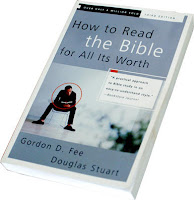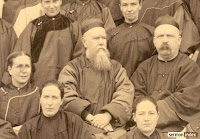 Some time ago I spoke at a Christian gathering about the righteousness and justice of God as well as the lordship of Christ. I used some of N T (Tom) Wright's material in my presentation. Afterwards someone asked me about Tom Wright's teaching because she had heard some negative comments about him.
Some time ago I spoke at a Christian gathering about the righteousness and justice of God as well as the lordship of Christ. I used some of N T (Tom) Wright's material in my presentation. Afterwards someone asked me about Tom Wright's teaching because she had heard some negative comments about him.I don't intend to defend Tom Wright's theology here. But I think it is unfortunate that Tom Wright has attracted quite a few negative comments about his teaching. Tom Wright is a fellow follower of Jesus who has made significant contribution to the church and the academic community. Wright is not always right. Nor is anyone of us.
One rather unfortunate misunderstanding is the association of the so-called New Perspective with Tom Wright. Some Christians express grave concerns about the New Perspective. But one must note that Tom Wright would have disagreed with certain views of E P Sanders, who is a leading figure of the New Perspective. In Wright's writings he regularly points out how Sanders has got it wrong (but agrees with him at certain points, as every good academic would have done).
In a previous post, I have mentioned how I came across Tom Wright's books. (Click here for the post.) But here I would like to say again that respected scholars like Gordon Fee has spoken very kindly of Tom Wright. Click here for an interview with Fee. Similarly, people like J I Packer have recommended Wright's books. (See back cover of some of Wright's books.) I have read books written by respected respected Christian leaders/scholars like Christopher Wright, Richard Hays and others, and often they cite Tom Wright and use his materials.
(An informed reader would know that there are other opponents of Tom Wright, who come from the other end of the theological spectrum. Space does not allow me to deal with that.)
I also found an article written by Doug Green, who is a professor at the Westminster Theological Seminary. This article is worth reading if one wants to read something from a conservative evangelical perspective. Click here for the article.
It does not mean that Fee, Packer and others would have agreed with Wright all the time. Nor does it mean that Wright would have agreed with them totally. But it does mean that Tom Wright is well received by respected evangelical Christian leaders.
Everyone has to read the Bible and determine whether they agree with Tom Wright. I can only let his own teaching speak for himself. But I feel a bit sad to find that people reject a Christian like him when they themselves haven't read much of him. Let's be a bit more gracious toward one another.




